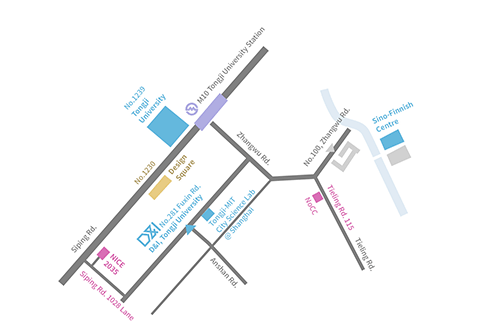Filippo Fabrocini is Full Professor in the College of Design & Innovation, Director of the “Sustainable AI Lab”, and among the founders of the Tongji University “AI & Art Lab”. He is also affiliated to the Italy National Research Council (Institute for Computing Applications), Deputy Editor of the “Journal of Experimental and Theoretical Artificial Intelligence”, and Associate Editor of the journal “AI & Society”. His main areas of interest are Machine Learning, Quantum Neural Networks, Ethical AI, and Computational Art.
Previously Filippo Fabrocini was Senior Researcher at IBM Research Center (1986 – 1992), where he worked in the Artificial Intelligence Team; Visiting Researcher in the School of Computer Science at Carnegie Mellon University (1987), where he worked with Prof. Herb Simon (ACM Turing Award/Nobel Prize); Professor in the Department of Philosophy at Gregorian University (1993-2001), where he held the Chair of Logic and then the Chair of History of Contemporary Philosophy (ad interim); and General Manager of the IBM Milan/Rome Business Innovation Center, where he managed a team of 40-45 headcounts including Creative Directors, UX Designers, UI Designers, Content Strategists, and IT Architects (2001-2010). In China, Filippo Fabrocini has been Full Professor in the Computer Science and Software Engineering Department at Sichuan University (2015 - 2016) and Full Professor in the Software Engineering Department at Beijing Institute of Technology (2016 – 2018) mainly teaching AI-related topics to Postgraduate students. Prof. Fabrocini got a Master in Philosophy (Rome, Gregorian University), a Master in Cognitive Sciences (Brighton, Sussex University), and a PhD in Philosophy, with a thesis on the Representational Theory of Mind. The Gregorian University is the most important academic institution belonging to the Holy See. The Philosophy Department included names such as Bernard Lonergan, Fredrick Copleston, and Johannes Baptist Lotz, among the most influential Christian philosophers of the second half of the past century. While teaching Philosophy at Gregorian University, Prof. Fabrocini taught courses on History of Contemporary Philosophy, with a particular emphasis on Adorno’s Theory of Art, Philosophy of Language, and Philosophy of Mind. In the same fashion, the Department of Cognitive Studies at Sussex University provided a unique opportunity to Prof. Fabrocini for studying a pioneering subject, as Cognitive Science was at that time, with eminent scholars such as Douglas Hofstadter, Aaron Sloman, and Margaret Boden.
Filippo Fabrocini has won multiple awards, including two IBM Outstanding Technology Awards (OTA) and one IBM Client-Value Outstanding Technical Achievement Award (OTAA). He has also received an Honor Award from the Executive Committee for Intelligence and Security Services (CESIS), an Italian government committee whose mission is the coordination of all the Italian Intelligence Sectors, chaired at that time by the past Prime Minister S. Berlusconi. This award has been attributed in recognition of his contribution to the design of a knowledge management/text mining system. The project has been also presented in the Italian Parliament. Prof. Fabrocini has a vivid interest in Modern/Contemporary Art coming from his own parents’ passion for collecting art. In China he lectured, among others, in artistic venues such as the Central Academy of Fine Arts (Beijing), the Lu Xun Academy of Fine Arts (Shenyang), and the Art Department at Renmin University about topics related to Modern/Contemporary Art. He also lectured in the School of Economics at Xiamen University (Xiamen) on the artpreneurship business. Prof. Fabrocini has also been the curator of art exhibitions both in Italy and in China. In the meanwhile, he has been continuously invited to deliver speeches and lectures related to AI topics including the Xinhua News Agency, the Guangdong TV Station, and the World Artificial Intelligence Conference 2021 (WAIC 2021) where he has been Keynote Speaker and moderator of three panels.
Main publications
[1] L. Di Pace, F. Fabrocini, M. Maggiore, "Conceptual Clustering: Using Apriori and Aposteriori Evidence to Generate a Hierarchical Taxonomy", in Atti del Congresso Annuale dell'Associazione Italiana per il Calcolo Automatico, AICA, Cagliari, 1988.
[2] L. Di Pace, F. Fabrocini, “Nuove frontiere nei sistemi esperti: apprendimento automatico di conoscenza”, in Note di Informatica, n. 20, 1988.
[3] F. Fabrocini, "Macchine che imparano e macchine che imparano ad imparare", in Homo Loquens, A. Lobato ed., Bologna, ESD, 1989.
[4] F. Fabrocini, "The SEL Project. An Application of AI Technology to the Preliminary Parts of Civil Proceedings", in Proceedings of the International Conference on Logic, Computer, Science and Law, Firenze, 1989.
(A paper dedicated to the design and the implementation of a logical model of 31 articles of the Italian Civil Code and the corresponding jurisprudence. The model included a hypothetical reasoning system as well.)
[5] L. Di Pace, F. Fabrocini, "Improving Knowledge-Based Systems via Conceptual Clustering", in Proceedings of the Tenth International Workshop on Expert Systems and Their Applications, Avignone, EC2, 1990.
[6] L. Di Pace, F. Fabrocini, "Using Classification to Guide Knowledge Acquisition and Refinement in Real-World Domains", in Cybernetics and Systems '90, Proceedings of the Tenth European Meeting on Cybernetics and System Research, London, World Scientific Publishing, 1990.
[7] L. Di Pace, F. Fabrocini, "Learning from Observation in Noisy Environments via Integration of EBL and SBL Techniques", in Proceedings of the Ninth European Conference on Artificial Intelligence, ECAI, London, Pitman Publishing, 1990.
(A paper making use of J. Pearl’s Belief Networks. It has been among the first ones to apply Pearl’s ideas.)
[8] F. Fabrocini, "Artificial Intelligence, Expert Systems, and Machine Learning: Techniques, Problems, and Perspectives", in Proceedings of the European School of Chemiometry, Tipografia Sibilli, Gargnano, 1990.
[9] L. Di Pace, F. Fabrocini, "Integrazione di tecniche empiriche ed analitiche nell'apprendimento da osservazioni", in Atti del Congresso Annuale dell'Associazione Italiana per il Calcolo Automatico, Bari, 1990.
[10] L. Di Pace, F. Fabrocini, ""Apprendimento da osservazioni in ambienti affetti da rumore", in Atti del Primo Workshop del Gruppo AIIA di Interesse Speciale sull'Apprendimento Automatico, Torino, 1990.
[11] L. Di Pace, F. Fabrocini, G. Bolis, "Shift of Bias in Learning from Drug Compounds", in Proceedings of the European Working Session on Learning, EWSL, Berlin, Springer-Verlag, 1991.
(An important paper among the first ones to introduce the notion of “bias” applied to Machine Learning and the technology for shifting automatically bias during the learning process.)
[12] G. Bolis, L. Di Pace, F. Fabrocini, "A Machine Learning Tool for Computer-Aided Molecular Design", in Proceedings of the IEEE International Conference on Tools for Artificial Intelligence, Los Alamitos, IEEE Computer Society Press, 1991.
[13] G. Bolis, L. Di Pace, F. Fabrocini, "A Machine Learning Approach to Computer-Aided Molecular Design", in International Journal of Computer-Aided Molecular Design, 5, 1991.
(This paper is still a milestone in the Computer-Aided Molecular Design area: it is the first paper to apply Machine Learning techniques to the design of new drugs.)
[14] G. Bolis, L. Di Pace, F. Fabrocini, "Apprendimento automatico nella progettazione di farmaci", in Note di Informatica, n. 26, 1991.
[15] G. Bolis, L. Di Pace, F. Fabrocini, "A Machine Learning System for the Structure-Activity Relationship Problem", in International Journal of Expert Systems, 5, 1992.
[16] L. Di Pace, F. Fabrocini, “Knowledge-Based Molecular Retrieval System and Method Using a Hierarchy of Molecular Structures in the Knowledge Base”, U.S. Patent, N. 5,418,944, 1992.
(IBM patent about Knowledge-Based Retrieval Techniques related to 3D representations of molecular structures.)
[17] F. Fabrocini, "Die Rolle der Praxis bei der Bildung der kognitiven Strukturen", in J. Quitterer & E. Runggaldier, eds. Der Neue Naturalismus - Eine Herausforderung an das christliche Menschenbild, Stuttgart, Kohlhammer, 1999.
(A paper making use of the notion of “action” for interpreting cognitive development.)
[18] F. Fabrocini, F., S. Jian'an, “Intelligent Process Automation of Industries Using Artificial Intelligence and Machine Learning”, in Journal of Computing and Natural Science 1:2, 2021
(A paper showing how the application of disruptive technologies is still a challenge in the industry sector).
[19] A. Addazi, P. Chen, F. Fabrocini, C. Fields, E. Greco, M. Lulli, A. Marciano, R. Pasechnik, “Generalized Holographic Principle, Gauge Invariance and the Emergence of Gravity a la Wilczek”, in Frontiers of Astronomy and Space Sciences, June 2021.
(A paper showing a generalized version of the holographic principle.)
[20] F. Fabrocini, K. Terzidis, “Re-framing AI: An AI Product Designer Perspective”, in Techne: Research in Philosophy and Technology, 25:3, 2022.
(A paper contributing to a critical re-framing of AI from a design point of view.)
[21] K. Terzidis, F. Fabrocini, H. Lee, “Unintentional intentionality: Art and Design in the Age of Artificial Intelligence”, in AI & Society, January 2022.
(A paper dedicated to revisiting the notion of “intentionality” from the point of view of AI Art.)
[22] A. Marcianò, D. Chen, F. Fabrocini, C. Fields, E. Greco, N. Gresnigt, K. Jinklub, M. Lulli, K. Terzidis, E. Zappala, “Quantum Neural Networks and Topological Quantum Field Theories”, in Journal of Neural Networks, 153, 2022.
(A paper dedicated to the implementation of Neural Networks on quantum platforms.)
[23] K. Terzidis, F. Fabrocini, “Deep Permutation Design. An AI-based Design Methodology”, in Leonardo, March 2023.
(A paper illustrating an AI-based methodology based on permutations and neural networks.)
[24] A. Marciano, D. Chen, F. Fabrocini, C. Fields, M. Lulli, Emanuele Zappala, “Deep Neural Networks as the Semi-classical Limit of Topological Quantum Neural Networks: The Problem of Generalization”, arXiv:2210.13741.
(A paper dealing with the problem of generalization in neural networks.)
[25] C. Fields, F. Fabrocini, K. Friston, J. F. Glazebrook, H. Hazan, M. Levin, A. Marciano, “Control flow in active inference systems Part I: Classical and quantum formulations of active inference”, in IEEE Transactions on Molecular, Biological and Multi-Scale Communications.
(A paper reviewing classical and quantum formulations of the Free Energy Principle.)
[26] C. Fields, F. Fabrocini, K. Friston, J. F. Glazebrook, H. Hazan, M. Levin, A. Marciano, “Control flow in active inference systems Part II: Tensor Networks as General Models of Control Flow”, in IEEE Transactions on Molecular, Biological and Multi-Scale Communications.
(A paper showing how Tensor Networks as control systems can be implemented within the general framework of quantum topological neural networks.)
[27] F. Fabrocini, K. Terzidis, “Finally, The Death of the Author!”, in AI & Society (forthcoming).
(A paper showing the AI role in the decommodification of the artistic venue.)
[28] F. Fabrocini, K. Terzidis, K. Jinklub, What Is the Problem with a Deontic Approach to AI? The Principle of “Autonomy” and the “Decide-to-Delegate” Model (submitted).
(A paper showing the limits of a purely deontic approach to Ethical AI.)
Books
[1] L. Di Pace, F. Fabrocini, Tecnologia dell'Apprendimento, Roma, Franco Angeli, 1990.
(The book is particularly relevant because it has been the first university textbook to be published in Italy about Machine Learning.)
[2] F. Fabrocini, Il labirinto e lo specchio. Tecniche e problemi della logica moderna, Roma, Franco Angeli, 1998.
(A book introducing to mathematical logic from a philosophical point of view.)
[3] F. Fabrocini, ed., Strategie collaborative e creazione del valore, Roma, Franco Angeli, 2010.


